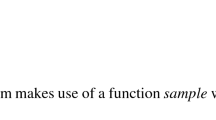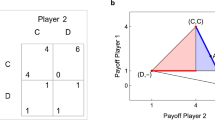Abstract
In this paper, we modify the finitely repeated prisoners' dilemma by adding an initial round in which the players have the option of simultaneously, unilaterally and publicly committing themselves, in an enforceable way, to a subset of their strategies. We show that when a large enough number of repetitions of the prisoners' dilemma follow this initial commitment round, then not only do the players have incentives to commit themselves to a limited strategy set, but there is also a symmetric subgame perfect equilibrium in which both players act cooperatively throughout the post-commitment stages of the game.
Similar content being viewed by others
References
E.E.C. van Damme, Stability and Perfection of Nash Equilibria, Springer, 1991.
J.N. Friedman, Cooperative equilibria in finite horizon noncooperative supergames, Journal of Economic Theory 35(1985)390.
D. Kreps, P. Milgron, J. Roberts and R. Wilson, Rational cooperation in the finitely repeated prisoners' dilemma, Journal of Economic Theory 27(1982)245.
R. Myerson, Communication, correlated equilibria and incentive compatibility, in: Handbook on Game Theory, Vol. 2, eds. R. Aumann and S. Hart, North-Holland, 1994, p. 827.
R. Radner, Collusive behavior in noncooperative epsilon-equilibria of oligopolies with long but finite lives, Journal of Economic Theory 22(1980)136.
R. Selten, Reexamination of the perfectness concept for equilibrium points in extensive games, International Journal of Game Theory 4(1975)25.
R. Selten, The chain store paradox, Theory and Decision 9(1978)127.
S. Sorin, Repeated games with complete information, in: Handbook on Game Theory, Vol. 1, eds. R. Aumann and S. Hart, North-Holland, 1992, p. 71.
Rights and permissions
About this article
Cite this article
Faíña-Medín, A., García-Jurado, I., Méndez-Naya, J. et al. Unilateral commitment in the finitely repeated prisoners' dilemma. Annals of Operations Research 84, 187–194 (1998). https://doi.org/10.1023/A:1018936819942
Issue Date:
DOI: https://doi.org/10.1023/A:1018936819942




